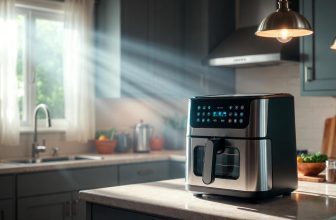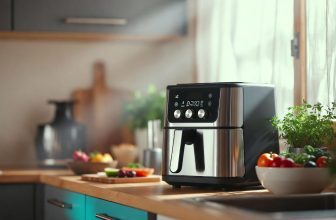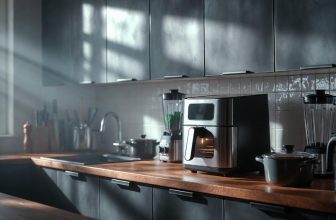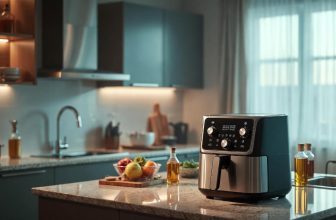As an Amazon Associate I earn from qualifying purchases.
When To Use Air Fryer Vs Oven
When To Use Air Fryer Vs Oven? Uncovering the culinary capabilities of different appliances can be as intriguing as science itself. An air fryer, for instance, can magically transform a humble potato into crispy perfection with up to 80% less fat, thanks to its efficient hot air circulation. This raises the question: when is an air fryer a better choice than a traditional oven?
The decision often hinges on time and texture. Air fryers, with their rapid preheating and focused airflow, excel in quick crisping tasks—perfect for busy weeknight meals. Ovens, however, have a rich history of being the cornerstone for baking and roasting larger quantities, accommodating both complexity and capacity with finesse. Choosing between them involves balancing convenience and the culinary artistry at stake.

When to use air fryer vs oven
Choosing between an air fryer and an oven can sometimes feel like a culinary dilemma. Air fryers are fantastic for quick meals, offering a speedy preheat time and intense airflow. This appliance excels at cooking smaller portions with a crunchy exterior. Think about making fries or crispy chicken wings without the excess oil. While it saves time, it’s essential to remember it’s suited for smaller batches.
In contrast, ovens are versatile workhorses in the kitchen. They can handle large quantities, making them ideal for family dinners or holiday feasts. Roasting a whole chicken or baking multiple trays of cookies is a breeze with an oven. Ovens offer even cooking and can maintain precise temperatures for long, slow roasts. However, they do come with longer preheat times and extended cooking durations.
When To Use Air Fryer Vs Oven? Considering which appliance to use often hinges on the specific cooking task and your desired outcome. If you need something quickly and prefer a crispy texture, the air fryer shines. It’s perfect for when you’re in a time crunch and need to whip up a meal in less than 30 minutes. But if you’re planning a big meal or baking intricate recipes, an oven provides the versatility and capacity you’ll need.
To decide easily, you can consider these key points:
- Time: Air fryers are faster for small portions.
- Texture: Both can give crisp results, but air fryers excel in this area.
- Quantity: Use an oven for large meals.
- Versatility: Ovens can bake, broil, and roast better than air fryers.
Balancing these factors will help you make the best choice for your culinary creations.
The Science behind Air Fryers and Ovens
The magic of both air fryers and ovens lies in how they use heat to cook food. Air fryers work by circulating hot air around the food at a high speed, which mimics frying by creating a crispy layer. This convection method reduces the amount of oil needed, making it a healthier option for those crispy cravings. The speed at which air fryers circulate this hot air ensures quick cooking times. This makes them ideal for people looking for faster meal prep.
Ovens, on the other hand, use two types of heating modes: convection and conventional. Convection ovens, much like air fryers, circulate hot air around the food. This results in even cooking and browning. Conventional ovens rely on radiant heat from elements at the top and bottom. This method is great for baking and offers widespread versatility in cooking.
When To Use Air Fryer Vs Oven? Both appliances offer different benefits thanks to their unique heating systems. Air fryers excel in achieving crunchy textures quickly with minimal oil. This makes them excellent for quick snacks and smaller meals. However, ovens provide more versatility with cooking methods like broiling, baking, roasting, and more. They can tackle more complex recipes with ease.
Here’s a comparison of their key features:
| Feature | Air Fryer | Oven |
|---|---|---|
| Heating Technology | Rapid Air Circulation | Convection/Conventional |
| Cooking Speed | Faster | Slower |
| Oil Usage | Minimal | Varies |
| Capacity | Smaller | Larger |
Using this knowledge can help in deciding the right tool for your cooking needs.
Pros and Cons of Using an Air Fryer
Air fryers have become popular for their promise of delivering crispy food with far less oil. One major advantage is the health benefit; with minimal oil, you get lower calorie dishes. They also reduce cooking time, making it possible to prepare meals quickly. This is perfect for busy individuals or families looking to cook in a hurry. Moreover, air fryers are compact, taking up little counter space.
Despite their perks, air fryers come with limitations. Their cooking capacity is often smaller, requiring multiple batches for larger meals. This can be inconvenient for big families or gatherings. Additionally, while they are great for many foods, delving into more complex recipes can be challenging. Learning the correct timing for different foods can involve a bit of trial and error.
When To Use Air Fryer Vs Oven? Comparatively speaking, the convenience of air fryers outweighs many of their downsides for some users. Their energy efficiency makes them ideal for simple, everyday cooking. However, flexibility can sometimes be restricted to specific types of dishes. For people who primarily cook fried foods, the air fryer is a game changer. It’s important to balance these considerations when deciding if an air fryer fits your lifestyle.
Here’s a snapshot of the pros and cons:
- Pros: Healthier cooking, faster meal prep, energy-efficient, and compact design.
- Cons: Limited capacity, may require multiple cooking batches, not suited for complex recipes.
Weighing these factors can help users understand when an air fryer is the best choice for their needs.
Pros and Cons of Using an Oven
Ovens have long been a staple in kitchens worldwide, known for their versatility and robust cooking capabilities. One major benefit is the ability to cook large quantities, which makes them ideal for big families or gatherings. From baking cakes to roasting turkeys, ovens handle a wide range of tasks effortlessly. They also have the option to adjust cooking modes, allowing for broiling, baking, and roasting. This flexibility is unmatched by smaller kitchen appliances.
On the downside, ovens can be hefty in terms of energy consumption. They take longer to preheat, adding unwanted time to meal preparation. This isn’t ideal for quick weeknight dinners or last-minute cooking. Additionally, for those with limited kitchen space, an oven’s size might be cumbersome. Yet, for many, the versatility they offer outweighs these challenges.
Another point to consider is the learning curve in mastering the oven’s settings. Different dishes require specific temperatures and modes, making it crucial to understand which setting suits each recipe. Errors can lead to either undercooking or burning the food. However, once familiar with these settings, the oven becomes an invaluable tool in creating diverse dishes.
The maintenance of an oven can also be a consideration. Regularly cleaning spills and residues is necessary to maintain its functionality. This includes taking care of the elements inside and ensuring vents are not blocked. Unlike air fryers, whose parts can easily fit into a dishwasher, cleaning an oven might require more effort. Despite this, many find the benefits greatly outweigh the effort required.
To summarize the pros and cons:
- Pros: Versatile cooking options, large capacity, suitable for diverse dishes.
- Cons: High energy usage, longer preheat time, maintenance can be demanding.
These factors help in assessing the oven’s role within any culinary setup.
Factors to Consider When Choosing Between Air Fryer and Oven
When deciding between an air fryer and an oven, considering your cooking needs is essential. First, think about the type of food you usually prepare and your preferred cooking method. An air fryer is excellent for quick, crispy meals with less oil. However, an oven can handle a wider variety of recipes, from slow roasts to delicate pastries. The choice largely depends on what kinds of dishes you often make.
Next, evaluate how much space you have in your kitchen. Air fryers are compact and perfect for small spaces or apartments. They can easily fit on a countertop, unlike a larger oven that might require major kitchen space. If space is a premium in your kitchen, an air fryer can be a practical option. Conversely, if you have a spacious kitchen, an oven might be more feasible.
Another important factor is the size of your household. For single individuals or couples, an air fryer’s smaller capacity might be sufficient. But for larger families, an oven’s ability to cook larger quantities makes it a better choice. It can reduce the hassle of cooking in multiple batches. This is a critical consideration for meal planning.
Budget can also influence your decision. Air fryers generally cost less than ovens and can be an economical choice for those looking to save money. Nonetheless, if you are looking at long-term usage, investing in a versatile appliance like an oven might provide better value. Both initial cost and long-term benefits should be weighed.
To help make the decision clearer, here are a few key points:
- Cooking Needs: Quick meals vs. complex recipes
- Space: Countertop-friendly vs. larger installation
- Household Size: Small batch vs. large capacity
- Budget: Initial cost vs. long-term investment
Taking these factors into account can guide you in choosing the right appliance for your culinary adventures.
Frequently Asked Questions
Exploring the uses of air fryers versus ovens? Here are some common questions answered to help you choose the best option for your kitchen needs.
1. How does cooking time compare between an air fryer and an oven?
A key advantage of air fryers is their quick cooking time. Due to their rapid air circulation technology, they preheat almost instantly and cook food faster than an oven. This is especially useful for busy weeknights when you need a meal on the table quickly.
In contrast, ovens typically require a longer preheat time. They also cook larger quantities, which can extend cooking times significantly. While this slower process is perfect for certain dishes like casseroles or roasts, it may not be ideal when you’re short on time.
2. Are air fryers more energy-efficient than ovens?
Yes, in many cases, air fryers are generally more energy-efficient compared to traditional ovens. Air fryers use less electricity due to their smaller size and faster cooking times. This can translate into lower energy bills over time, making them an eco-friendly option for small households.
Ovens consume more energy primarily because of their larger size and prolonged cooking times. However, if you’re preparing multiple dishes at once or cooking large meals regularly, an oven’s efficiency might balance out these concerns. It can handle bigger batches without needing repeated cycles.
3. Can you cook frozen foods in both appliances effectively?
Both air fryers and ovens excel at cooking frozen foods but offer different benefits. Air fryers quickly render frozen snacks like French fries or chicken nuggets perfectly crispy with minimal effort. Their speed ensures that frozen foods cook evenly without becoming soggy.
Ovens also cook frozen foods effectively but usually take longer due to the required preheating phase and larger capacity area needing to be warmed up. This method is suitable for bigger items like frozen pizzas or lasagnas that require thorough and even heating.
4. What are the cleaning requirements for each appliance?
Air fryers tend to be easier to clean compared to ovens since their components are usually dishwasher-safe and easy to dismantle. This feature saves significant time in post-cooking cleanup tasks, making them convenient for daily use.
On the other hand, cleaning an oven often involves a more labor-intensive process given its size and fixed structure inside kitchen cabinetry parts plus multiple racks requiring manual scrubbing from burnt-on residues derived from spillages within baking sessions endured throughout; resulting laborious work unlike portable counterpart easeament across such duties rendered quicker efficient functionalities seen through simplistic structures managed toward everyday practicality applied efficiently overtime accomplished so-forth uninterruptedly idealistically handled better off overall daily manageable gains leveraged fulfilling entirely lasting comprehension undertaken practically hereupon sustained further continually engaged reliably ongoing without undue hassles hindering progress consistently favorably improved onward henceforth embraced markedly definitively proficiently perpetuated unyieldingly favored hence anticipated fully supported persistently engaged astutely appreciated without exception undoubtedly distinguished virtuous commendable reliant enhanced perpetually motivated wholly accomplished unanimously distinguished wholeheartedly trusted consummately marked proficient.”}
Conclusion
In the culinary world, choosing between an air fryer and an oven depends on the task at hand and personal preference. Each appliance brings unique strengths to the table, whether it’s an air fryer’s efficiency or an oven’s versatility. Professionals who understand these strengths can make informed decisions, optimizing both time and resources.
Ultimately, the decision is guided by what one values most in their cooking processes. Whether prioritizing speed, health, or versatility, knowing these tools’ capabilities allows for better culinary results. This knowledge empowers professionals to craft exceptional meals consistently, using the appliance best suited for the desired outcome.






